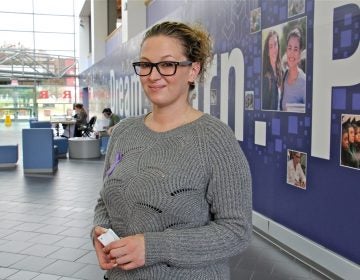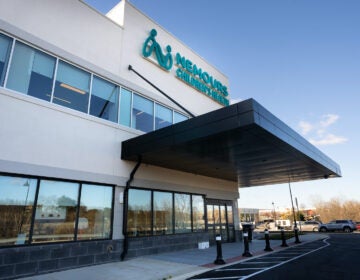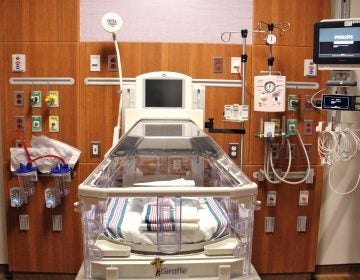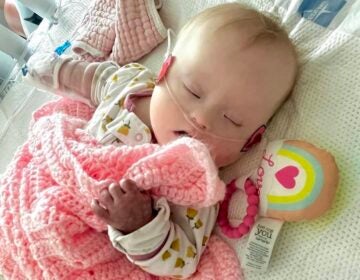Study shows new infant RSV antibody shot is highly effective. Delaware Valley pediatricians are hopeful for more protections next fall
A recent study by the CDC showed the antibody shot prevented RSV hospitalization in 90% of infants.
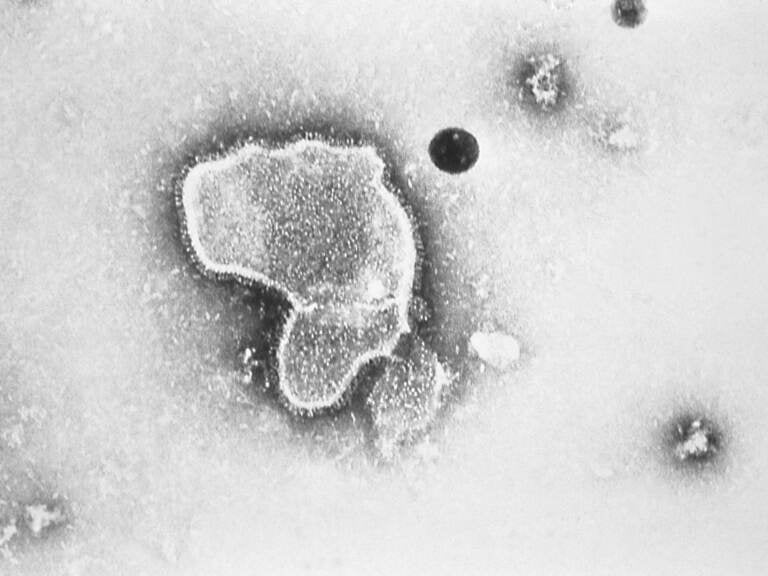
An electron micrograph of Respiratory Syncytial Virus, also known as RSV. (CDC via AP)
From Philly and the Pa. suburbs to South Jersey and Delaware, what would you like WHYY News to cover? Let us know!
New federal data shows that a first-of-its-kind treatment designed to temporarily protect infants from severe respiratory syncytial virus, or RSV, has been highly effective.
Last October, pediatricians began administering nirsevimab — sold under the brand name Beyfortus — as an antibody treatment against RSV. The drug, despite a slow initial rollout with logistical challenges, prevented hospitalization in 90% of infants who received shots this season.
The data, coupled with other advancements in RSV vaccines for adults, could be “huge” for public health, said Dr. Jonathan Miller, chief of pediatric primary care at Nemours Children’s Health in Delaware.
“The potential is really exciting for next season,” he said. “We’re going to come into the next season with the right amount in stock and with knowledge about this drug and hopefully with a lot of parents that know about it and have confidence in it.”
Health providers in the Delaware Valley hope these results will encourage more families and parents to get the treatment for their babies, and ultimately create more protection in the community against a virus that often overwhelms hospitals in the winter.
Between 58,000 and 80,000 children younger than 5 years old are hospitalized with RSV every year in the U.S., and as many as 300 die, according to data from the Centers for Disease Control and Prevention.
For most healthy adults and older children, RSV causes no more than a common cold. But elderly adults and infants are vulnerable to more serious illness.
“It was one of those diseases that, for my whole career, we were always hoping we would have something to prevent it,” Miller said.
The preventative treatment, approved by the U.S. Food and Drug Administration last July as a single-dose monoclonal antibody shot, mimics the immune system’s ability to fight off the virus. Clinical trials showed that it provided protection for at least five months.
The treatment is recommended for all infants younger than eight months who are entering into or are born during their first RSV season, as well as children up through 19 months who are at an increased risk for serious illness.
The drug’s early rollout last fall came with some challenges — a limited supply of doses, uncertainty over insurance coverage for patients and families, and eligibility questions.
Most of those issues were eventually resolved, said Dr. Lori Handy, pediatric infectious disease physician at Children’s Hospital of Philadelphia. The health organization has administered the treatment to about 6,000 children since October.
Handy said by next fall, the treatment should be widely accessible on all fronts.
“Providers are a lot more familiar now,” Handy said. “We understand our process, we understand our demand and how to talk about this with families. I expect anybody who wants RSV protection of some form will be able to get it.”
Experts say shots should be offered and given to newborns at the hospital immediately after they are born. But they can also be given in outpatient pediatric offices later.
A new RSV vaccine for pregnant people can provide immunity to even more infants. That vaccine is recommended for people who are 32 through 36 weeks pregnant in September through January. Their babies are considered protected from RSV and most won’t need an antibody shot.
With increased awareness about the different options for RSV protection, Miller said he hopes to eventually see large-scale public health benefits.
“You’ll hopefully see RSV disease in the community really drop,” he said. “I don’t think we saw a dramatic amount of that this year. This winter was still full of RSV, influenza, COVID and other viruses. I bet next year, we’re really going to start to actually feel the impact of this.”
Between the current respiratory season and next fall, Handy said there’s a lot of work to be done around education and messaging about the antibody shots and addressing any concerns or hesitancy.
“People ask a lot of good questions and we probably can answer them and move most of those families towards acceptance,” she said, “but it’s work whenever there’s something new and different.”

Get daily updates from WHYY News!
WHYY is your source for fact-based, in-depth journalism and information. As a nonprofit organization, we rely on financial support from readers like you. Please give today.



